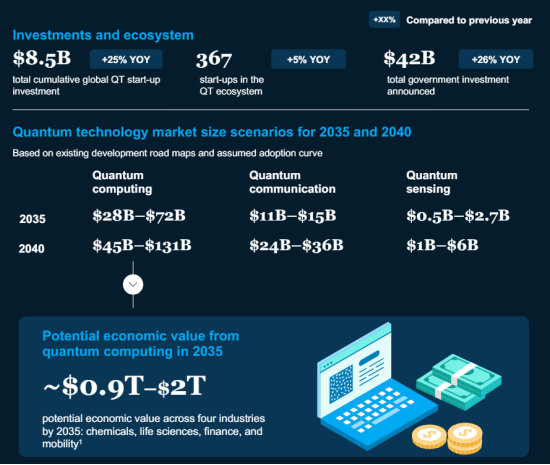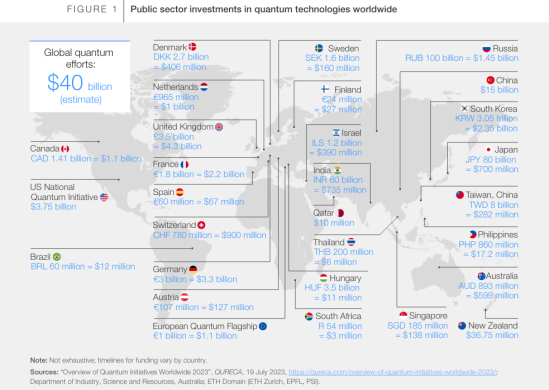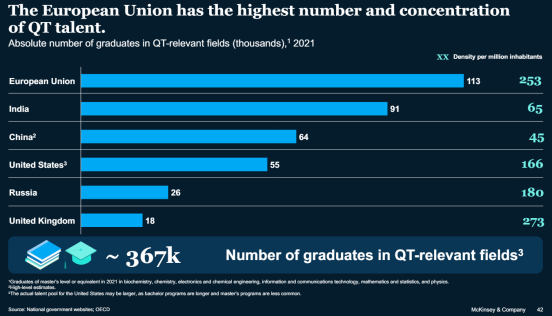Quantum Technology: Applications and Impact

Quantum technology is set to permeate and influence every key sector of the economy, ushering us into a period that could be termed the post-quantum era. This will collectively generate economic impacts and a unique economic ecosystem, which we call the quantum economy. Despite its promising prospects, quantum technology remains unfamiliar to most people. As pointed out by Saka, there is a significant lack of public awareness and understanding of this technology, and the World Economic Forum's Quantum Economy Network is working to bridge this knowledge gap.

What is Quantum Technology?
Quantum technology is based on the principles of quantum mechanics. These are the physical laws that apply to subatomic particles, dating back to the work of physicists like Niels Bohr, Werner Heisenberg, and Erwin Schrödinger in the 1920s. In fact, quantum technology is not a completely new concept; it has long played a role in the development of nuclear energy and is the foundation of semiconductor technology in modern mobile phones and numerous electronic devices.
Currently, quantum computing is one of the most prominent areas of application of quantum technology. At its core is the qubit, the fundamental unit of information that, thanks to quantum superposition, can exist in multiple states simultaneously, giving quantum computing a significant advantage in solving complex problems. However, as QuSecure co-founder Rebecca Krauthamer points out, the significance of quantum technology goes far beyond simply enhancing computing speed; it represents a whole new way of thinking.
Applications and Development of Quantum Technology
In practical applications, quantum sensors have demonstrated sensitivity far exceeding that of traditional sensors and have already played important roles in next-generation medical devices, geofencing, navigation, and mineral exploration. Especially in the field of navigation, quantum technology is expected to overcome various challenges faced by existing GPS systems, providing more precise positioning services.

In the field of communications, quantum technology offers a revolutionary solution for secure data transmission. Countries around the world are actively investing in the development of quantum technology, with China currently being a leader in the field. The World Economic Forum's "Quantum Economy Blueprint" emphasizes that building a complete industry value chain and strengthening international cooperation is crucial for the development of the quantum economy. At the same time, it is important to be wary of the formation of a "quantum divide" to avoid the over-concentration of technological development in a few countries.
Talent cultivation is another critical factor in driving the development of quantum technology. Currently, the EU has the most densely concentrated talent pool in quantum technology, but as the technology advances, the demand for talent will continue to grow. Moreover, cybersecurity is a key issue. As quantum computing capabilities increase, existing encryption standards may be challenged, but new technologies like quantum key distribution provide stronger security assurances for data.

How to Prepare for Quantum Technology?
Because most of the data stored today has a long shelf life, it's important to anticipate the time when quantum technology becomes the standard rather than the exception. For organizations, however, an even stronger reason to prepare for the quantum future is the development of generative artificial intelligence.
"AI is a technology that has been in development for a long time, and if you ask experts, they'd say they've been excited about it for 10 to 15 years. But for most people, there was a ChatGPT moment a few years ago when suddenly everyone started paying attention to it," says Leichenauer. "Those who drive change are now leading the change. And those who didn't foresee the change, unfortunately, make up the majority, and they are now busy figuring it out. Leichenauer states, 'When suddenly everyone else starts using quantum technology on a large scale, you won't want to be caught off guard.' Especially when IBM researcher and Quantum Infrastructure Director Jerry M Chow points out that 'quantum computers are getting better and better.' Krauthamer agrees: 'My only advice is to start now.'"
Conclusion
Quantum technology is ushering in a new era that will not only reshape the economic landscape but also alter the trajectory of human civilization. In the face of this technological revolution, the wisest choice is to take action now and actively embrace this quantum era full of opportunities and challenges.